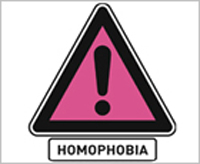
Homophobia and criminalization of consensual adult sexual behaviour represent major barriers to effective responses to HIV.
By signing the 2006 United Nations Political Declaration on HIV/AIDS, governments committed to removing legal barriers and passing laws to protect vulnerable populations. However, over 80 countries still criminalize consensual same sex acts among adults.
It is against this repressive context that communities worldwide celebrate the International Day Against Homophobia each 17 May, which marks the anniversary of the World Health Organization’s decision to remove homosexuality from its list of mental disorders in 1990. Therefore, 17 May is an opportunity to highlight once again the urgent need for joint efforts to reduce and end discrimination, violence and criminalization based on sexual orientation.
Homophobia and criminalization of consensual adult sexual behaviour represent major barriers to effective responses to HIV. Such responses depend on the protection of the dignity and rights of all people affected by HIV, including their right and ability to organize and educate their communities, advocate on their behalf, and access HIV prevention and treatment services.
“The decision to criminalize same sex relations is a serious setback to the AIDS response and to the rights of those affected by the law,” said Michel Sidibé, Executive Director of UNAIDS. “As these discriminatory laws can drive people underground, they will have a negative impact both on the delivery of HIV prevention programmes and on access to treatment for those living with HIV.”
Evidence shows that protection of the rights of men who have sex with men, lesbians and transgenders, both in law and practice, combined with scaled-up HIV programming to address their HIV and health needs are necessary and complementary components for a successful response to the epidemic.
UNAIDS urges all governments to take steps to eliminate stigma and discrimination faced by men who have sex with men, lesbians and transgenders and create social and legal environments that ensure respect for human rights and universal access to HIV prevention, treatment, care and support.
“There is no place for homophobia. Universal access to HIV prevention, treatment, care and support must be accessible to all people in need—including men who have sex with men,” said UNAIDS Executive Director Michel Sidibé.
Countries that have non-discrimination laws against men who have sex with men, injecting drug users and sex workers have achieved higher rates of coverage of HIV prevention efforts.




